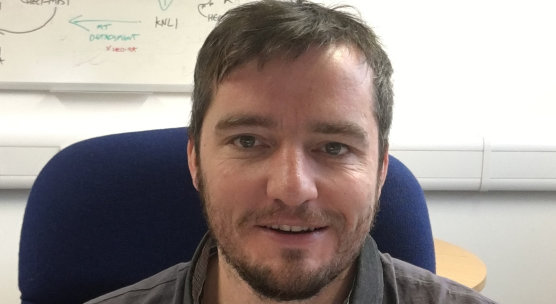£1.3million funding for research into the cellular division errors that drive cancer
Published On Fri 22 Jan 2016 by Grant Hill

The University of Dundee’s Dr Adrian Saurin has been awarded £1.3million to explore how the body’s cells replicate themselves correctly and why this goes wrong in cancer.
Dr Saurin, of the University’s School of Medicine, has received the funding from Cancer Research UK to carry out fundamental research into the mechanism of cellular division. Four new posts will be created as part of the six-year study.
When division occurs, the new cells should be exact copies of the original but this process goes wrong in the vast majority of cancer cells. The result is that cells within the same tumour often have a genetic makeup that is diverse and constantly changing. This is important because it allow tumours to rapidly evolve and overcome any challenges they may face.
Dr Saurin and his team hope to understand the molecular basis for these errors by focussing on an area that is currently not well understood but which may have implications for other diseases.
It is well established that two major classes of enzymes – kinases and phosphatases – control almost every signalling response in the body at some level but, until now, they have been almost exclusively studied independently. As Dr Saurin points out, however, there are many cases in which these opposing enzymes need to work together.
“There is a huge body of work to show how kinases turn signals on and we are slowly beginning to understand how phosphatases work to switch these signals off,” explained Dr Saurin. “If all signals were simple binary on/off switches then we would soon have a good appreciation for how they work.
“In reality however, signal responses are often far more complex than that – they come in a variety of different shapes and sizes that must be precisely regulated in both time and space. This is very likely to require kinases and phosphatase to work together and yet this ‘cooperativity’ is something we know almost nothing about.”
The award will allow the Dundee team to explore why this is particularly relevant for cell division. Dr Saurin and his colleagues previously found that a key division checkpoint relied on the cooperative action of two kinases and two phosphatases to work correctly.
They showed that the way all these enzymes were coupled together allowed the checkpoint signal to switch on and off rapidly, leading Dr Saurin to consider how studying kinase-phosphatase coupling could be important to understand cancer growth.
“I think this is an important aspect of signal transduction which could be very revealing in terms of disease,” said Dr Saurin. “The key is to learn how whole networks function together rather than simply studying their constituent parts individually. We will begin to tackle this using an interdisciplinary mix of quantitative cell biology, synthetic biology and computational modelling.
“We hope that this type of holistic approach will reveal how key systems-level properties are controlled, for example, we predict that the network we recently identified could ensure chromosome segregation is robust and reliable. These are fundamental properties of all living things that, importantly, are also weakened in cancer cells to fuel progression of the disease. We hypothesise that subtle changes in the kinase-phosphatase balance could be responsible.”
Nell Barrie, senior science information manager at Cancer Research UK, said, “We’re delighted to be funding Dr Saurin’s research in Dundee. His work will help us better understand the complex process of cell division, and some of the ways this can go wrong in cancer. As we build a better picture of exactly how cancer cells replicate, we may find new weaknesses that we can target with treatments.
“Last year, Cancer Research UK funded £116 million of fundamental research like Dr Saurin’s. This research underpins all cancers and is vital in helping us bring forward the day when all cancers are curable.”
Notes to editors:
About Cancer Research UK
- Cancer Research UK is the world’s leading cancer charity dedicated to saving lives through research.
- Cancer Research UK’s pioneering work into the prevention, diagnosis and treatment of cancer has helped save millions of lives.
- Cancer Research UK receives no government funding for its life-saving research. Every step it makes towards beating cancer relies on every pound donated.
- Cancer Research UK has been at the heart of the progress that has already seen survival in the UK double in the last forty years.
- Today, 2 in 4 people survive their cancer for at least 10 years. Cancer Research UK’s ambition is to accelerate progress so that 3 in 4 people will survive their cancer for at least 10 years within the next 20 years.
- Cancer Research UK supports research into all aspects of cancer through the work of over 4,000 scientists, doctors and nurses.
- Together with its partners and supporters, Cancer Research UK's vision is to bring forward the day when all cancers are cured.
For further information about Cancer Research UK's work or to find out how to support the charity, please call 0300 123 1022 or visit www.cancerresearchuk.org. Follow us on Twitter and Facebook.
For media enquiries contact:
Grant Hill
Press Officer
University of Dundee
Nethergate, Dundee, DD1 4HN
Tel: +44 (0)1382 384768
Mobile: 07854 953277
Email: g.hill@dundee.ac.uk